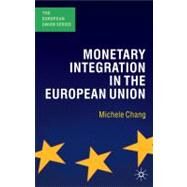Monetary Integration in the European Union
, by Chang, Michele- ISBN: 9780230542853 | 0230542859
- Cover: Paperback
- Copyright: 5/15/2009
| List of figures, tables and boxes | p. vii |
| Abbreviations | p. ix |
| Preface | p. xi |
| Introduction | p. 1 |
| Understanding monetary integration - ideas, interests and institutions | p. 6 |
| Plan of the book | p. 10 |
| The origins of economic and monetary union | p. 15 |
| Bretton Woods and the return to fixed exchange rates | p. 15 |
| The end of Bretton Woods and the beginning of European monetary cooperation | p. 21 |
| The European Monetary System and the road towards EMU | p. 26 |
| Theoretical considerations | p. 37 |
| Conclusion | p. 43 |
| The birth of the euro and the Eurozone | p. 45 |
| Negotiating and renegotiating monetary union | p. 45 |
| Launching monetary union | p. 57 |
| Theoretical considerations | p. 63 |
| Conclusion | p. 69 |
| The institutions and decision processes of monetary union | p. 71 |
| Architecture | p. 71 |
| EMU's major actors | p. 77 |
| Accountability and governance | p. 86 |
| Reforming the Eurozone's governance system | p. 92 |
| Theoretical considerations | p. 94 |
| Conclusion | p. 101 |
| Centralizing monetary policy cooperation: the European Central Bank | p. 103 |
| The road (back) to Frankfurt | p. 103 |
| Structure of the ECB | p. 106 |
| Operations of the ECB | p. 112 |
| The ECB and its critics | p. 114 |
| Theoretical considerations | p. 117 |
| Conclusion | p. 122 |
| Decentralizing economic policy cooperation: the Stability and Growth Pact and the Lisbon Strategy | p. 123 |
| The Stability and Growth Pact | p. 124 |
| Theoretical considerations | p. 132 |
| Economic policy coordination: soft law and the open method of coordination | p. 139 |
| Theoretical considerations | p. 153 |
| Conclusion | p. 158 |
| The European Union without EMU: the United Kingdom, Denmark, Sweden and the accession countries | p. 160 |
| How to become a member of the euro area | p. 161 |
| Opting-out - the United Kingdom and Denmark | p. 162 |
| States without opt-outs | p. 171 |
| Theoretical considerations | p. 179 |
| Conclusion | p. 190 |
| The international role of the euro | p. 192 |
| Challenging the dollar? | p. 192 |
| External representation | p. 200 |
| Future prospects | p. 213 |
| Theoretical considerations | p. 218 |
| Conclusion | p. 221 |
| The Eurozone: an initial balance sheet | p. 223 |
| Economic consequences of the euro | p. 223 |
| Political consequences of the euro | p. 239 |
| Theoretical considerations | p. 245 |
| Conclusion | p. 251 |
| Conclusion: an efficient and legitimate EMU? | p. 253 |
| Glossary | p. 262 |
| Bibliography | p. 274 |
| Index | p. 304 |
| Table of Contents provided by Ingram. All Rights Reserved. |
The New copy of this book will include any supplemental materials advertised. Please check the title of the book to determine if it should include any access cards, study guides, lab manuals, CDs, etc.
The Used, Rental and eBook copies of this book are not guaranteed to include any supplemental materials. Typically, only the book itself is included. This is true even if the title states it includes any access cards, study guides, lab manuals, CDs, etc.
Digital License
You are licensing a digital product for a set duration. Durations are set forth in the product description, with "Lifetime" typically meaning five (5) years of online access and permanent download to a supported device. All licenses are non-transferable.
More details can be found here.






